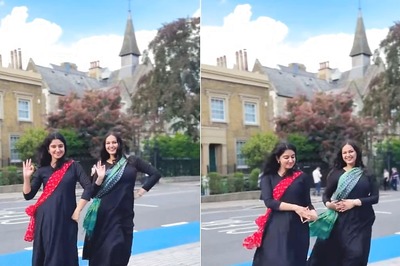
views
"Love is blind and love can be foolish" - Unknown
This quote wouldn't have been as meaningful ever as it is today and will be in future particularly in Indian context.
I was talking to a friend of mine the other day. She teaches in a school where children are predominantly from urban middle class families. A bit concerned, she confessed to me "Deepika, the way kids are growing these days...it's scary. Children of class six, seven are being caught kissing on the campus and there is little teachers or anyone can do. I am a little perturbed about where the young generation is headed."
I myself got a bit wary, but sadly my friend's concern is not unfounded. There have been several incidents where teenagers have been caught smoking, drinking, indulging in acts that are too dangerous for their age. Ironically, freedom for young generation has acquired a whole new meaning. They don't want to compromise on exploring life to the fullest. Given the taboo sex is in our Country, most of these adventures fall on the lines of sexual pleasure. People want to experiment, explore, excite themselves beyond imaginations and are ready to take chances. Commitment has little meaning. A direct result of this "not until I am sure" thinking is leading to a rampant rise in live-in relationships. Both boys and girls today want to be fully sure before they step into that sacred bond (which to me is also losing its essence given the high rise in number of divorces within months of marriage). Youngsters, who travel to all parts of the country for jobs, away from cultural tethers of society and parents, often get into these relationships that often mean "no strings attached."
Well, the "no strings attached" however, would soon have legal strings around it. Though a live-in means get in get out if it's not working out, for both the partners, laws defining the ambit of these relationships are in the offing. As per recent news reports, on suggestions by the Supreme Court of India, Law Commission is working on a legal framework for these relationships and rights of "partners." No matter how illogical it sounds, but yes, it is the truth. The news also mentions that Law Commission has met experts and "women rights groups" and discussions are on with respect to the rights of dependent partner, alimony rights, maintenance etc.
I have put the words partners and women rights groups in quotes above since that forms the basis of my post. While partners word sound very gender neutral to me, consultation of the law commission with women rights groups sends shudders down my spine. I would not hesitate to add that discussion with these groups means we are on the brink of having one more anti-male law that would victimise millions of unsuspecting men in this country (I say unsuspecting because I have rarely seen men knowing anything about laws of marriage before tying knots). The reason for that - women rights groups have a history of looking at women as "victims." While they denounce patriarchy and advocate gender equality, they have maintained the perennial victimhood of women and played crucial role in drafting extremely biased gender specific laws.
The Domestic Violence Act 2005 that describes Domestic Relationship as "a relationship between two persons who live or have, at any point of time, lived together in a shared household, when they are related by consanguinity, marriage, or through a relationship in the nature of marriage, adoption or are family members living together as a joint family" precisely covers live in relationship and entitles a woman in such a relationship to every kind of benefits a married woman in entitled to including financial, residential, custody, compensation and maintenance rights.
So do we need a new law for Live-In? In my view, no! But in the eyes of women rights groups - Yes! For a simple reason that despite any facts of the marriage or a live-in relationship, it is always the man who is to be blamed for the failure of that relationship. Precisely because of this reason, a man in domestic relationship has no specific law to his disposal, even if he is abused by his partner. Though abuse in a domestic relationship covers physical, mental, emotional, financial or any other abuse, our laws think men can never be subjected to such abuse by a woman. Thus, no matter how abusive the relationship, if a man wants to break free, the woman has number of laws to her disposal that she can use to teach the man a lesson. Section 498A of IPC and Domestic Violence Act made for women who are abused in a relationship have been misused by the privileged ones with aplomb and despite several guidelines and checks, the victimisation of men and their families continue. There is no need of any evidence for these laws, word of a woman is gospel truth that's why the DV Act says "aggrieved person" means any woman who is, or has been, in a domestic relationship with the respondent and who alleges to have been subjected to any act of domestic violence by the respondent. An allegation is enough to crucify a man and his family.
A new law for Live-in would be nothing but an eyewash in name of protecting women in live in relationships. The law would be another tool in the hands of women who would want to get back at their partners who failed to please them or who she perceived as the wrong doer. We are already seeing deluge of live in relationships being turned into rape cases. No matter if the live in was for 3 or 4 or 5 years or even 14 years, if a woman says she has been raped, she has been raped. Thus, the victimized partner in new law for live in relationships perhaps would also be woman only.
Ironically, there is no education of basic laws in our country. Men would be locked up without locking the relationship. Any act of theirs could be termed as harassment and they would pay for it for rest of their lives. Not only they, perhaps their families too. More and more youth would end up in courts, fighting emotional battles for rest of their lives. Laws that impact society as a whole cannot be and should not be formed with opinions of select set of people. Lawmakers need to involve society and stakeholders who would be directly impacted by these laws. Else, who benefits - well we can assume and who loses - Society, with no trust on any relationship! Worth it? Not sure!
(Deepika Narayan Bhardwaj is a journalist and a documentary filmmaker. She is currently documenting misuse of section 498A of IPC through her documentary film 'Martyrs of Marriage.' She can be reached at [email protected])

















Comments
0 comment